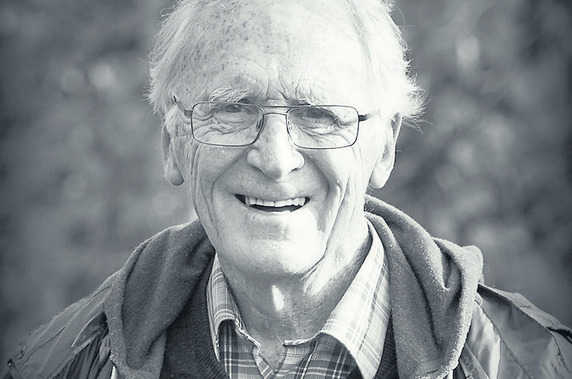Evangelicalism in crisis
Mary Davis interviews Ranald Macaulay for en
Ranald Macaulay

Ranald Macaulay studied Law at Cambridge University.
While there, he met Francis and Edith Schaeffer who had recently started the L’Abri Fellowship in Switzerland. Ranald worked with them for four years – and married their daughter, Susan. Soon after completing a theology degree at Kings’ College, London, Ranald and Susan and their family established a L’Abri community in the UK. During that time, he was involved in planting two churches. After many years, Ranald and Susan moved to Cambridge where he ran Christian Heritage. Ranald and Susan have six children and 11 grandchildren. Ranald is the co-author of Being Human: The Nature of Spiritual Experience (IVP, 1978; republished Solway, 1996).
en: What are you reading?
RM: I’ve just finished Theistic Evolution edited by JP Moreland, Stephen Meyer, Christopher Shaw, Ann Gauger and Wayne Grudem. And I’m also studying the Middle Ages.
en: Francis Schaeffer had a huge influence on you – which of his books is a ‘must read’?
RM: I would go for How Should We Then Live?
en: Which of today’s authors write with particular clarity?
RM: Nancy R. Pearcey is a ‘big picture’ thinker and very helpful. Her new book Why the Call to Love ‘Thy Body’? addresses important current issues. John Lennox, too, is always worth reading.
en: Which biblical doctrine do you find yourself mulling over in your mind?
RM: At the moment, creation. It’s big for me right now and, in my view, central for this age in the church’s history.
en: What is it about heaven that you are most looking forward to?
RM: I learn hymns because I find them so helpful. There’s a verse in George Matheson’s O Love That Will Not Let Me Go which puts it well:
‘O Joy that seekest me through pain,
I cannot close my heart to thee;
I trace the rainbow through the rain,
And feel the promise is not vain,
That morn shall tearless be.’
en: You are on record as being concerned about the state of evangelicalism today. Why is that?
RM: The church is at a critical point in history. The entire culture is racing down a dangerous track: it doesn’t believe that God exists; Jesus is totally irrelevant, just a story from first-century Palestine. I sometimes call this the ‘plausibility problem’ – the message of Christianity just doesn’t seem plausible to our culture. At the same time, we’ve got technology developing at a million miles a minute. That accelerates the effect of the ‘plausibility problem’ quite remarkably.
What creates the seriousness of the situation we’re facing is the ‘double whammy’ of those two things: the perceived implausibility of Christianity and the impact of technology.
An example of the accelerating effect of technology is David Attenborough’s revelation in Planet Earth II that plastics are destroying our oceans. This is one of countless ways in which technology has transformed the world. And it’s happened with such speed. Add to that the effects of television, the Internet, phones, social media and so on.
I think that’s the essence of the problem. What we’ve got on our hands is probably the most serious shift in the history of the human race ever. The changes that have taken place intellectually and practically are seismic. Western civilisation sees reality now in a completely different way, no longer as a ‘creation’ but as a mechanical thing. Technology aggravates this to the power of 100. This is what makes post-modernism so powerful. Despite the fact that it lacks any sort of intellectual coherence the mood of the post-modern age – its atmosphere, concerns and speed of change – is very, very powerful. And the direction it’s going in is toxic for the whole planet. Even secular writers are worried. Take Douglas Murray, author of The Strange Death of Europe, or people like Roger Scruton, or Melanie Phillips (who has just given a speech out in Israel)1. They’re deeply alarmed at where we’re heading. It’s very serious.
And, here’s the point: the church doesn’t seem to me to be engaged with this very much. It’s carrying on as if nothing’s changed. Most evangelicals seem to be burying their heads in the sand. Of course, there are notable exceptions, but these are mostly found amongst para-church organisations. By and large the churches themselves seem to be unaware of the gravity of the situation. That’s why I’m so troubled.
en: Can you give me an example of why you feel that the churches are failing to engage with the problem?
RM: Well, one of my phrases – and I admit it’s a bit provocative – is that ‘the pulpit is the culprit’.I’m not suggesting for a moment that preaching isn’t absolutely central. The Word of God must be proclaimed and explained; God’s revealed truth has to be communicated verbally. Without it, the church dies. Of course.
But here’s the point: for all our emphasis on ‘expository preaching’ and ‘gospel churches’ I think we’ve succumbed to what I call sola scrip- tura in vacuo. In other words, this emphasis while necessary and good is being undermined by the fact that our preachers aren’t actually addressing the situation our culture is in – especially things like the plausibility problem.
An excellent treatment of this and related issues can be found in Serving the Church, Reaching the World (edited by Richard Cunningham in honour of Don Carson’s 70th birthday). The chapters by Kirsten Birkett, Stefan Gustavsson, Jim Packer and Richard himself should be required reading in every Evangelical church in the country!
en: So are you talking about application?
RM: No, it’s deeper than application. Paul says, ‘Don’t be conformed to this world but be transformed by the renewing of your mind’. Of course, the renewing of our minds involves many things, but it certainly isn’t just the regurgitating of Scripture texts or explaining biblical doctrines.
It means we’re helped to understand the world we’re living in on the basis of God’s revealed truth. We’re helped to address it and challenge it, intellectually as well as practically. By contrast, sola scriptura in vacuo tends to make our preaching formulaic and predictable. Sermons rotate around two or three issues and those in the pews go out none the wiser about how to speak into this crazy new environment we live in.
en: How do you think we got into that situation?
RM: There’s a big history behind that. I trace it back to the German Pietist movement in the 18th century with Jakob Spener and others. They were trying to resist the cold orthodoxy that had crept into the post-Reformation Lutheran churches and focused on assemblies of piety (collegia pietatis they called them). They quite rightly wanted heart-renewal and not just head-knowledge – but they ended up with the heart rather than the head; and the private (that is, my own little world, my church, my community) rather than the public (that is, society at large).
Soon evangelism and legalistic conformity began to fill the screen. Nobody was encouraged to ask: ‘Where is the whole society heading?’ Essentially, the public arena was surrendered to the devil – while the evangelicals absented themselves to concentrate on ‘church activities’. Too much of that still remains within UK Evangelicalism, though we may deny it. We faithfully believe in and systematically teach the credal truths – but, because of this ‘Pietist hangover’, we do both in abstract.
en: And is it right that Francis Schaeffer anticipated this?
RM: Schaeffer’s concerns all turned around the issue of Truth: is True-Truth possible in a finite and human existence?
As a consequence of Descartes and others, the Existentialists ended up saying this kind of Truth is impossible. ‘Don’t worry about essence’ they said – just worry about existence’ (by which they meant experience). So, our individual experience is all we’re left with. That’s where we are with Post-Modernism, hence the gender-crisis today.
By contrast, Schaeffer’s great concern was that God’s revealed truth in Scripture is really true – an accurate description of the universe in which we find ourselves. Not ‘spiritual’ or ‘relativist’ or ‘existentialist’ truth.
en: This is a pretty grim diagnosis. I hope you have got some wisdom for us about how to deal with it…
RM: Yes, it is grim. The question is, is it right? I’m also convinced there are no easy solutions. That doesn’t mean we can’t work for renewal and reformation. I think Schaeffer had helpful insights and, looking back, I’m sad that UK evangelicalism brushed him aside. But nothing is going to be easy for us given our present situation.
More next month…
Mary Davis is a wife & mum at St Nicholas Church, Tooting, and a freelance editor.
FOOTNOTE
1 www.standpointmag.co.uk/node/7087/full\


